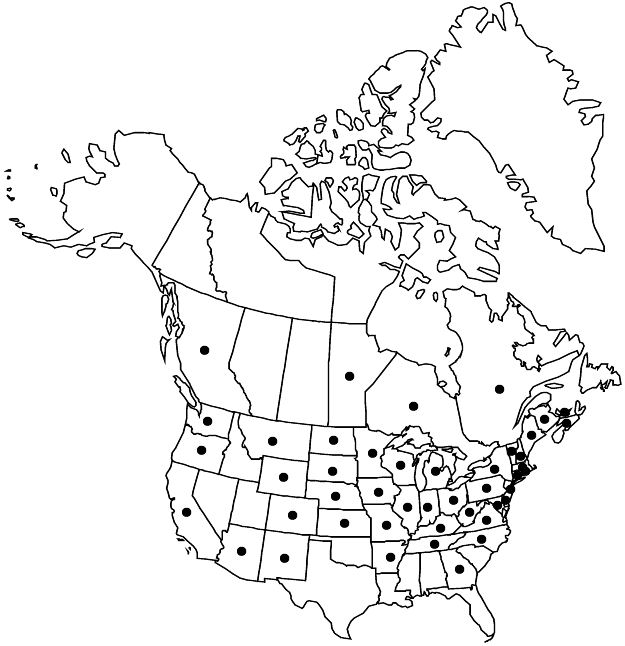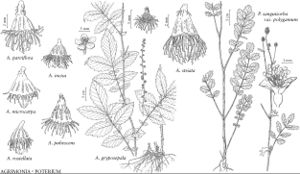Difference between revisions of "Agrimonia gryposepala"
Beitr. Bot. 1: 49, plate 1, fig. 8. 1842.
FNA>Volume Importer |
imported>Volume Importer |
||
| (6 intermediate revisions by 2 users not shown) | |||
| Line 10: | Line 10: | ||
|special_status={{Treatment/ID/Special_status | |special_status={{Treatment/ID/Special_status | ||
|code=F | |code=F | ||
| − | |label= | + | |label=Illustrated |
}} | }} | ||
|basionyms= | |basionyms= | ||
| Line 16: | Line 16: | ||
|name=Agrimonia eupatoria var. parviflora | |name=Agrimonia eupatoria var. parviflora | ||
|authority=Hooker | |authority=Hooker | ||
| − | }}{{Treatment/ID/Synonym | + | |rank=variety |
| + | }} {{Treatment/ID/Synonym | ||
|name=A. macrocarpa | |name=A. macrocarpa | ||
|authority=(Focke) Rydberg | |authority=(Focke) Rydberg | ||
| − | }}{{Treatment/ID/Synonym | + | |rank=species |
| + | }} {{Treatment/ID/Synonym | ||
|name=A. parviflora var. macrocarpa | |name=A. parviflora var. macrocarpa | ||
|authority=Focke | |authority=Focke | ||
| − | }}{{Treatment/ID/Synonym | + | |rank=variety |
| + | }} {{Treatment/ID/Synonym | ||
|name=Eupatorium gryposepalum | |name=Eupatorium gryposepalum | ||
|authority=(Wallroth) Nieuwland | |authority=(Wallroth) Nieuwland | ||
| + | |rank=species | ||
}} | }} | ||
|hierarchy=Rosaceae;Rosaceae subfam. Rosoideae;Rosaceae tribe Agrimonieae;Agrimonia;Agrimonia gryposepala | |hierarchy=Rosaceae;Rosaceae subfam. Rosoideae;Rosaceae tribe Agrimonieae;Agrimonia;Agrimonia gryposepala | ||
| Line 40: | Line 44: | ||
|elevation=0–2000[–3000] m | |elevation=0–2000[–3000] m | ||
|distribution=B.C.;Man.;N.B.;N.S.;Ont.;P.E.I.;Que.;Ariz.;Ark.;Calif.;Colo.;Conn.;Del.;Ga.;Ill.;Ind.;Iowa;Kans.;Ky.;Maine;Md.;Mass.;Mich.;Minn.;Mo.;Mont.;Nebr.;N.H.;N.J.;N.Mex.;N.Y.;N.C.;N.Dak.;Ohio;Oreg.;Pa.;R.I.;S.Dak.;Tenn.;Vt.;Va.;Wash.;W.Va.;Wis.;Wyo.;Mexico (Chiapas;Coahuila;Nuevo León);Central America (Guatemala). | |distribution=B.C.;Man.;N.B.;N.S.;Ont.;P.E.I.;Que.;Ariz.;Ark.;Calif.;Colo.;Conn.;Del.;Ga.;Ill.;Ind.;Iowa;Kans.;Ky.;Maine;Md.;Mass.;Mich.;Minn.;Mo.;Mont.;Nebr.;N.H.;N.J.;N.Mex.;N.Y.;N.C.;N.Dak.;Ohio;Oreg.;Pa.;R.I.;S.Dak.;Tenn.;Vt.;Va.;Wash.;W.Va.;Wis.;Wyo.;Mexico (Chiapas;Coahuila;Nuevo León);Central America (Guatemala). | ||
| − | |discussion=<p>In the mountains of the western United States, Mexico, and Guatemala, populations of Agrimonia gryposepala are widely scattered. The species is absent from the Great Basin. Plants with stems and abaxial leaflet surfaces more densely hirsute and leaflets less than 7 cm are sometimes found in the mountains of the western United States and are the predominant morphs of A. gryposepala in Chiapas and Guatemala. We have seen only three specimens from Coahuila and Nuevo León; the relative occurrence of the morphs there cannot be determined.</p> | + | |discussion=<p>In the mountains of the western United States, Mexico, and Guatemala, populations of <i>Agrimonia gryposepala</i> are widely scattered. The species is absent from the Great Basin. Plants with stems and abaxial leaflet surfaces more densely hirsute and leaflets less than 7 cm are sometimes found in the mountains of the western United States and are the predominant morphs of <i>A. gryposepala</i> in Chiapas and Guatemala. We have seen only three specimens from Coahuila and Nuevo León; the relative occurrence of the morphs there cannot be determined.</p> |
|tables= | |tables= | ||
|references= | |references= | ||
| Line 49: | Line 53: | ||
-->{{#Taxon: | -->{{#Taxon: | ||
name=Agrimonia gryposepala | name=Agrimonia gryposepala | ||
| − | |||
|authority=Wallroth | |authority=Wallroth | ||
|rank=species | |rank=species | ||
| Line 63: | Line 66: | ||
|publication title=Beitr. Bot. | |publication title=Beitr. Bot. | ||
|publication year=1842 | |publication year=1842 | ||
| − | |special status= | + | |special status=Illustrated |
| − | |source xml=https:// | + | |source xml=https://bitbucket.org/aafc-mbb/fna-data-curation/src/2e0870ddd59836b60bcf96646a41e87ea5a5943a/coarse_grained_fna_xml/V9/V9_515.xml |
|subfamily=Rosaceae subfam. Rosoideae | |subfamily=Rosaceae subfam. Rosoideae | ||
|tribe=Rosaceae tribe Agrimonieae | |tribe=Rosaceae tribe Agrimonieae | ||
Latest revision as of 22:57, 5 November 2020
Herbs, 3.5–15 dm. Roots: tubers absent. Stems with glistening stipitate-glandular hairs and hirsute (hairs scattered, erect, 2 mm). Leaves: mid cauline stipules ± 1/2-ovate, margins incised; major leaflets 3–9 (mid cauline 5–7), minor 1–4, rarely 0–1, pairs; major leaflet blades ovate to elliptic or rhombic, terminal largest, largest of these 2.4–10.5 × 1.4–5.6 cm, margins serrate, apex acute, sometimes acuminate, abaxial surface usually with glistening stipitate-glandular hairs and hirsute (hairs scattered, 0.5–2 mm). Inflorescences: axes with glistening stipitate-glandular hairs and hirsute (hairs erect, 2 mm). Flowers usually ± alternate. Fruiting hypanthia turbinate to broadly campanulate, rarely broadly obconic, 2.3–5.8 × 2.8–6.2 mm, deeply to sometimes obscurely sulcate, hooked bristles in 4–5 circumferential rows, proximal row reflexed, with glistening stipitate-glandular hairs and sparsely hirsute. 2n = 56.
Phenology: Flowering Jul–mid Aug[–Mar].
Habitat: Edges, open spaces, and thickets, deciduous or mixed pine-deciduous woods
Elevation: 0–2000[–3000] m
Distribution

B.C., Man., N.B., N.S., Ont., P.E.I., Que., Ariz., Ark., Calif., Colo., Conn., Del., Ga., Ill., Ind., Iowa, Kans., Ky., Maine, Md., Mass., Mich., Minn., Mo., Mont., Nebr., N.H., N.J., N.Mex., N.Y., N.C., N.Dak., Ohio, Oreg., Pa., R.I., S.Dak., Tenn., Vt., Va., Wash., W.Va., Wis., Wyo., Mexico (Chiapas, Coahuila, Nuevo León), Central America (Guatemala).
Discussion
In the mountains of the western United States, Mexico, and Guatemala, populations of Agrimonia gryposepala are widely scattered. The species is absent from the Great Basin. Plants with stems and abaxial leaflet surfaces more densely hirsute and leaflets less than 7 cm are sometimes found in the mountains of the western United States and are the predominant morphs of A. gryposepala in Chiapas and Guatemala. We have seen only three specimens from Coahuila and Nuevo León; the relative occurrence of the morphs there cannot be determined.
Selected References
None.
